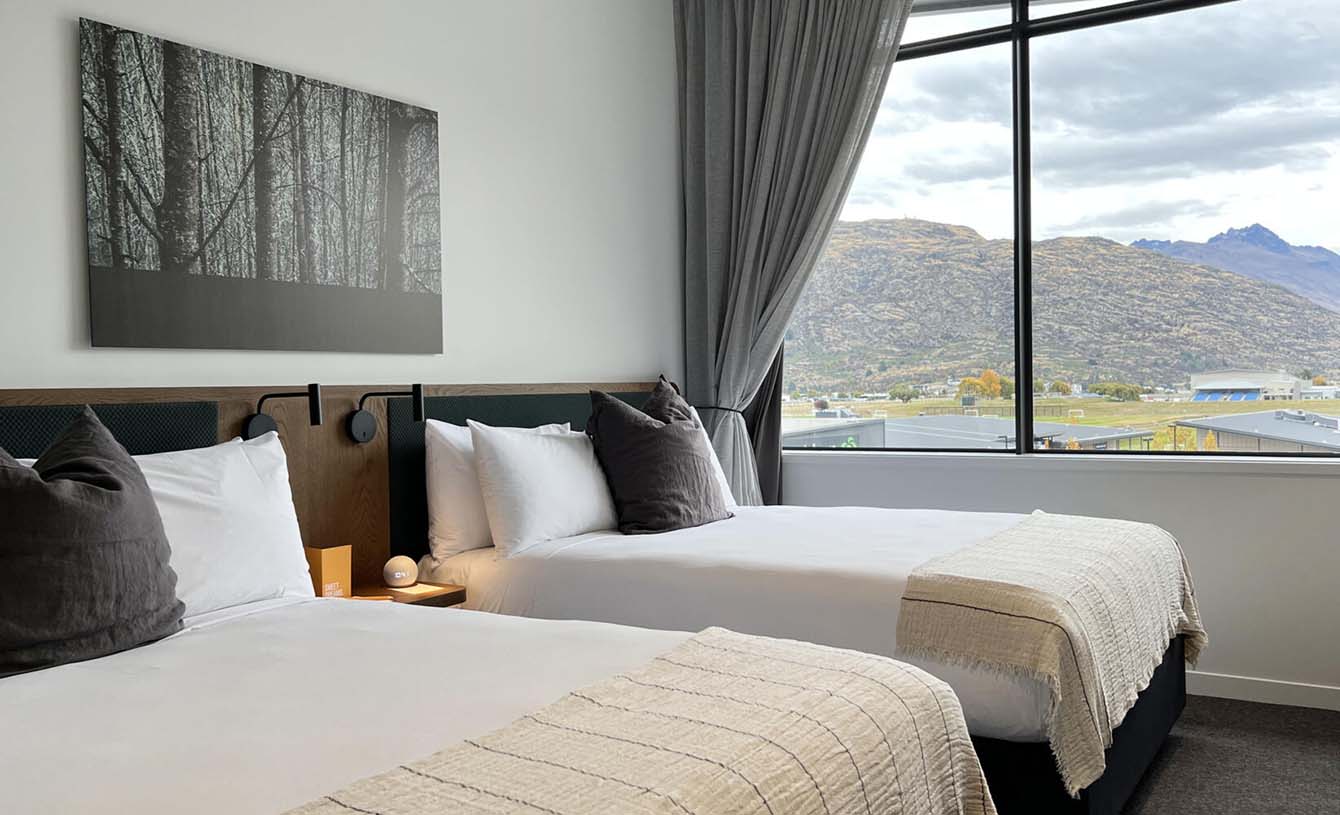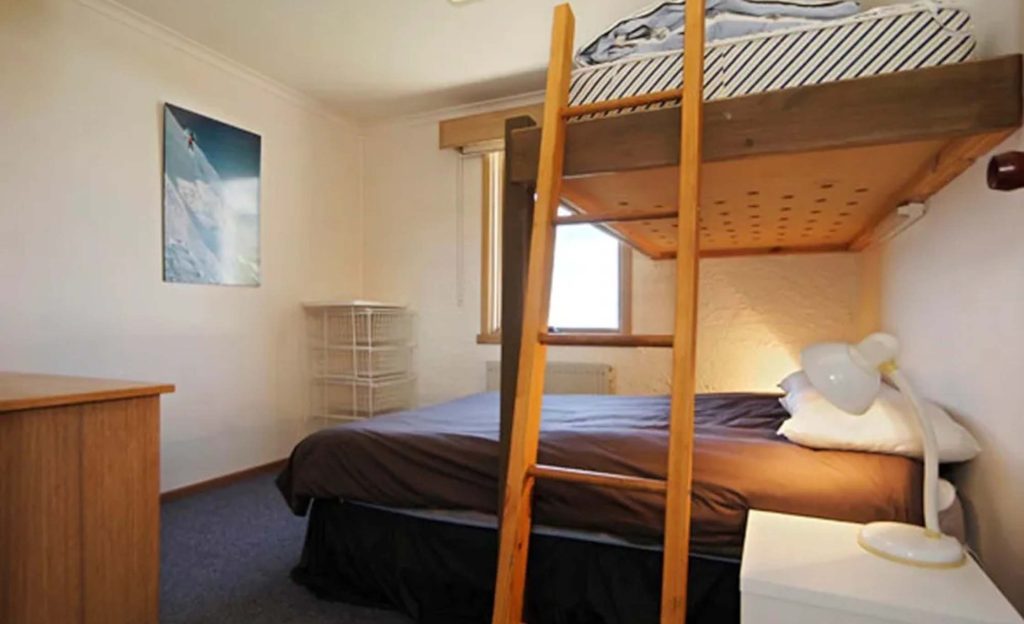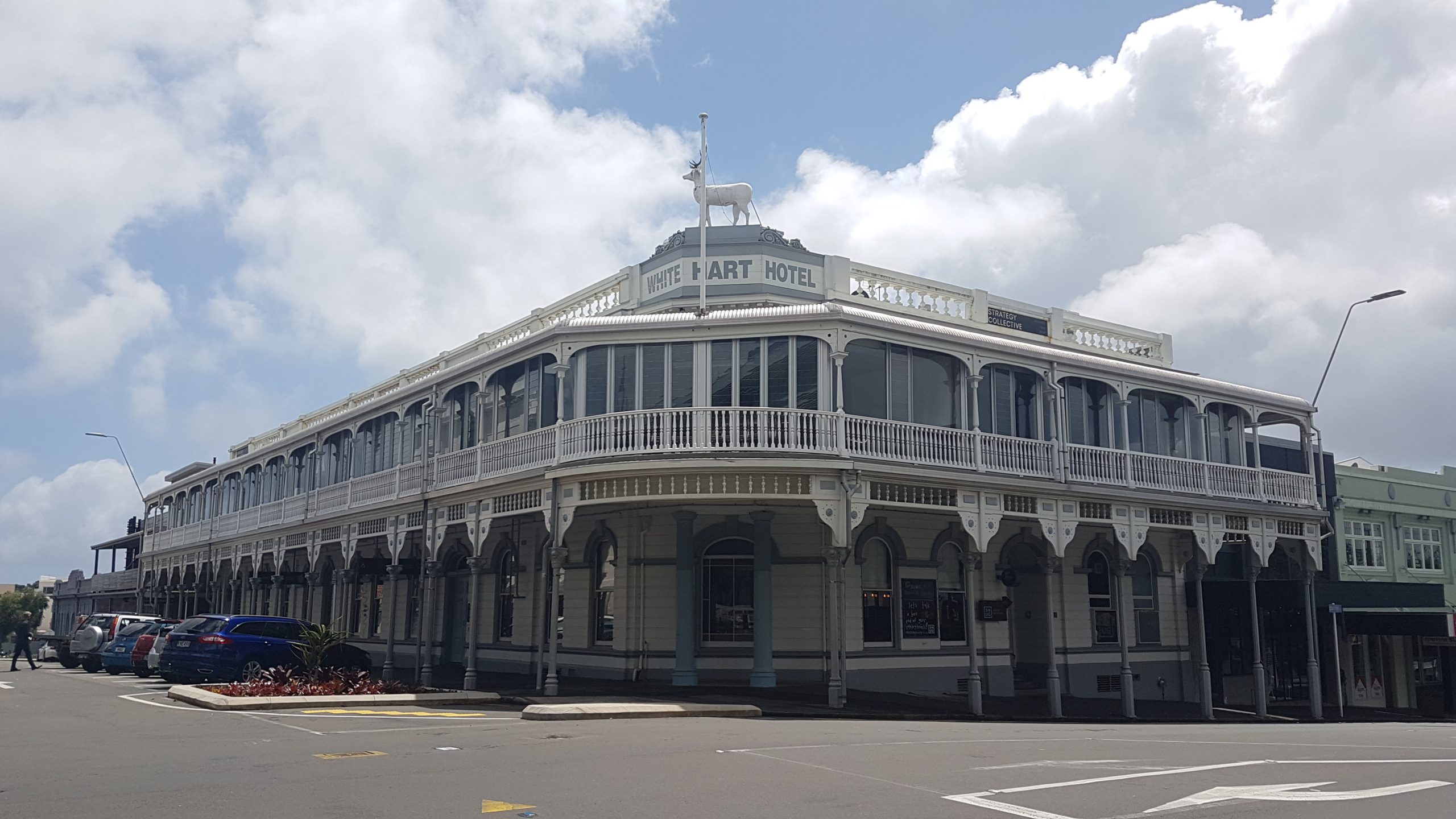Thanks to its diverse range of visitors, New Zealand offers various types of accommodation. If you have a substantial budget, you can indulge in the luxury of five-star city hotels and exclusive lodges in natural settings, such as the Bayview Chateau Hotel in Tongariro National Park.
For a more back-to-basics experience, you can stay at one of New Zealand’s many excellent campsites or on a genuine Kiwi farm. Alternatively, you can opt for a Bed & Breakfast, sometimes housed in historic buildings. Many travelers choose more budget-friendly options like hostels or camper vans.
Hotels & Motels in New Zealand
The cheaper hotels in New Zealand are often quite basic: your room may not have a television, and the furniture is simple. You’ll find these mainly in pubs and bars in city centers and smaller towns. Prices for a double room range from NZ$30 to NZ$50.
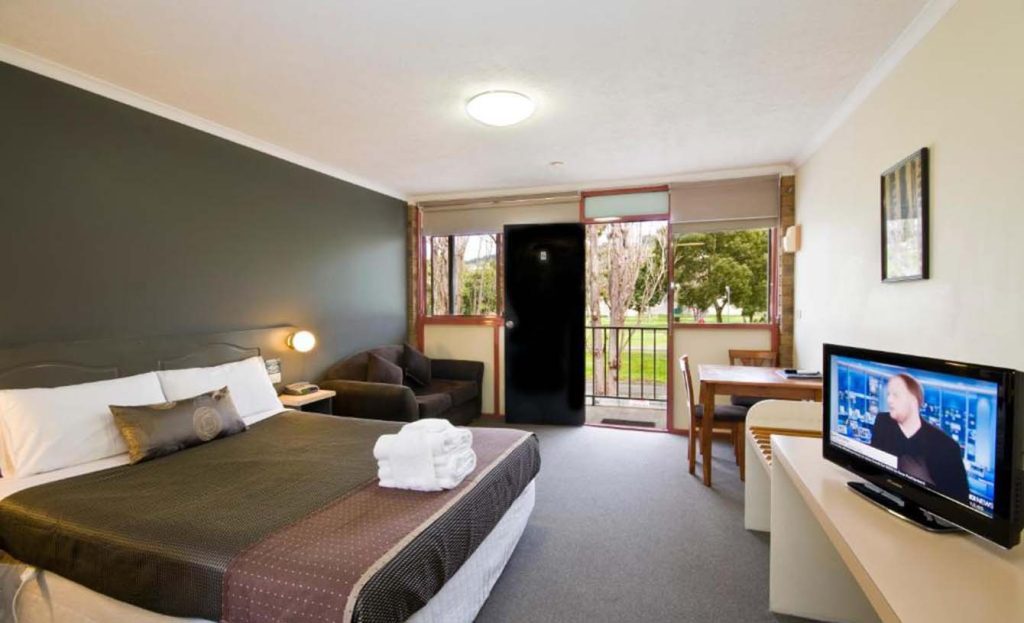
Since the rooms are often rather plain, you’ll likely spend time in the pub’s bar. Staying here means you’ll have an excellent opportunity to meet local Kiwis and learn about their habits.
If you prefer more luxury, you’ll find it in New Zealand. Internationally renowned hotel chains have established themselves here as well. Especially in larger cities like Auckland, Wellington, and Christchurch, you’ll find hotels from chains like Hyatt, Hilton, and The Langham Hotel, offering comfort, good sanitation facilities, and a hearty breakfast. However, this luxury comes at a price: prices for a double room start around NZ$100 and go up quickly.
Motels in New Zealand generally offer comfortable and affordable accommodations, especially for groups. You’ll often find them on the outskirts of cities and towns, making them a convenient option for road-trippers. Don’t expect the latest interior trends, especially in smaller towns.
Hostels in New Zealand
Many traveling visitors to New Zealand opt to stay in a hostel or youth hostel, and for good reason! Thanks to the presence of many backpackers, the selection is vast and spread throughout the country.
You can sleep in a dormitory with 12 other party animals in a massive hostel in the heart of a big city, or in a double room in a youth hostel nestled in a picturesque natural setting. Most hostels offer sleeping arrangements that fall between these two extremes, catering to everyone.
You’ll generally encounter mostly younger travelers, but older ones are also welcome. In New Zealand, there are several hostel organizations, with Hostelling International (formerly YHA) and Budget Backpacker Hostels New Zealand (BBH) being the largest.
When you join these organizations – which you can do at any affiliated hostel – you’ll get discounts on accommodation, activities, and transportation. It’s especially recommended to get the BBH card (NZ$50). This organization has many affiliated hostels, which are generally quite good.
Clean, comfortable, and affordable
New Zealand is known for its good hostels because they are clean, comfortable, and affordable. They also have excellent facilities. Expect to pay around NZ$15 for a night in a dorm and about NZ$40 for a double room, depending on the season. During the high season – between November and February – prices are higher, and due to the crowds, it’s wise to book in advance. Sometimes there are single rooms available for NZ$30.
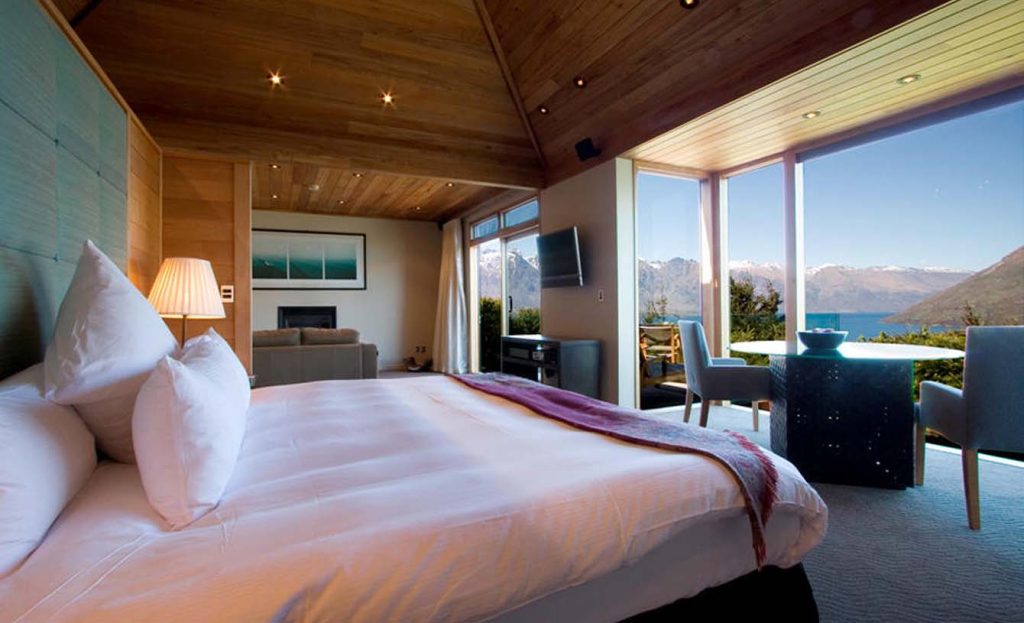
Bedding is usually provided, so you don’t need to bring a sleeping bag, but bring your own towel. Washing machines are often available, and there’s a kitchen where you can prepare your own meals and store your food in fridges. There’s always a common area where you can eat, watch TV, and connect with other travelers. Especially this last point is one of the most enjoyable reasons to stay in a hostel.
It’s useful to know that hostels often advertise jobs for backpackers. So if you want to earn some extra money, check the bulletin boards in common areas. You’ll also often find advertisements from backpackers and other travelers looking to sell their car or find hitchhikers to share petrol costs.
If you want to know details about the hotels, you can look through here.
Campsites & Campervans in New Zealand
New Zealand is the epitome of beautiful nature. If you’re even remotely a nature enthusiast, camping in New Zealand is a must-do. Campsites can be found throughout the country, often in the most beautiful locations, and their quality is among the highest in the world! Kiwis love camping so much that they jokingly call sleeping at home “indoor camping.”
There’s always a spot available, and you can often reserve far in advance. Campsites, also known as holiday parks or motor camps, have excellent facilities for tents, campervans, and caravans. Expect good sanitary facilities and often a kitchen where you can cook your meals.
There are various accommodation options at campsites in New Zealand. You can pitch your tent, although few Kiwis do that. Prices range from NZ$3 to NZ$14 per night. Campervans have their own spot where you can plug in electricity. With a camper plus two adults, you’ll pay around NZ$20 to NZ$35 per night.
A cabin is a small, simple house with a mattress, towels, table, chair, and kitchen utensils. Prices start at around NZ$30 for a room. There are also cabin dorms where you sleep with multiple people in one room. A cabin is an excellent alternative to a hostel!
Tourist Flats
There are also tourist flats at New Zealand campsites. These are small apartments that are similar to cabins but a bit more luxurious. There’s a kitchen, toilet, and bathroom. You’ll need to bring your bedding. Prices are around NZ$30. A motel at a campsite is a luxurious tourist flat with a more extensive kitchen and bathroom. Bedding and towels are provided, and it costs approximately NZ$50 to NZ$65.
DOC Campsites
The most beautiful places in New Zealand are home to campsites managed by the Department of Conservation (DOC). These campsites are located in the heart of nature parks and reserves and are often half the price of regular campsites, sometimes even free! A few beautiful free campsites can be found on the South Island on D’Urville Island in Nelson / Marlborough, in Temple Forest in Canterbury, and Gillespies Beach on the West Coast. On the North Island, you can camp for free at Forest Pools in Northland, Dickeys Flat in the Bay of Islands, and Kaimanawa Forest Park in Wanganui. For more information, visit the DOC website.
These campsites have minimal facilities, and sometimes there’s nothing more than a cold tap. Expect cold showers, and there may not even be toilets. You’ll pay no more than NZ$6 per person. These campsites are recommended for true nature lovers.
Campervans
The campervan is an ideal means of transport if you want to explore on your own terms. Many rental companies are mainly located in Auckland, Christchurch, and Queenstown. You can rent a camper with two, four, or six sleeping spots, complete with amenities. The rental price depends on the size and season.
Be sure to reserve your camper in advance because it’s a very popular mode of transport and accommodation. You can spend the night with the camper at campsites on a pitch with electricity, where there are also dumping stations for toilets and wastewater. You can also park the camper right in the middle of nature, except in the National Parks where camping may be restricted.
Wild Camping in New Zealand
If you’ve spent all your budget but still have a tent, thumbs up for New Zealand. There are various places where you can camp for free. Wild camping means camping somewhere that isn’t an official campsite. It happens in parks, reserves, forests, mountains, and on beaches. Sometimes you’ll feel like you’re alone in the world and completely back to nature. Of course, there are no facilities.
Unlike Australia, this isn’t allowed everywhere. Each region has different rules about where you can and can’t set up your tent or park your camper van. Inquire about this at local Visitor Centers. Kiwis often patrol these areas, so you might be asked to move during the night and find another spot. Generally, they won’t mind as long as you’re respectful and don’t cause any disturbance.
As idyllic as wild camping can be, the downside is that there’s sometimes a lack of social control. The attack on the Dutch couple who were wild camping on the North Island at the end of 2006 is still fresh in everyone’s memory. The New Zealand authorities described this incident as “very unusual.” So be cautious.
